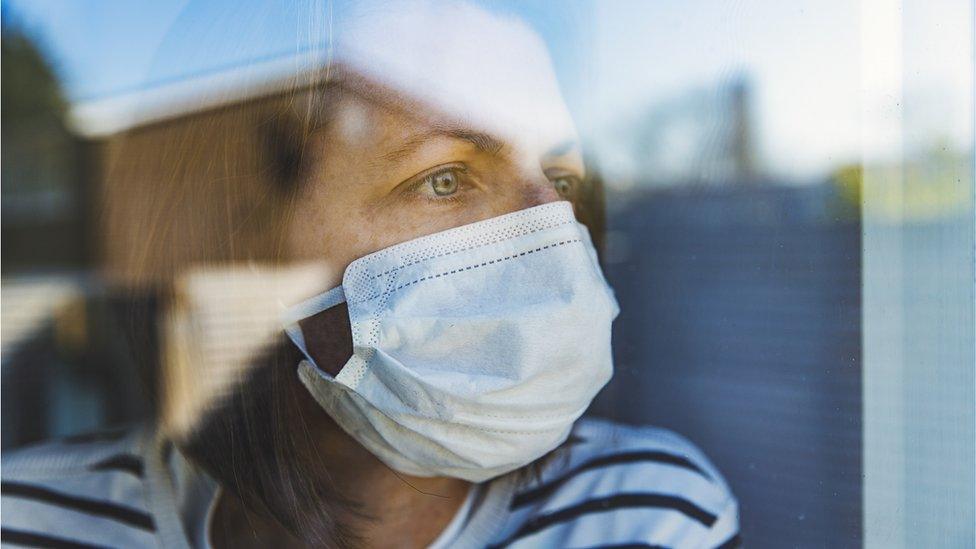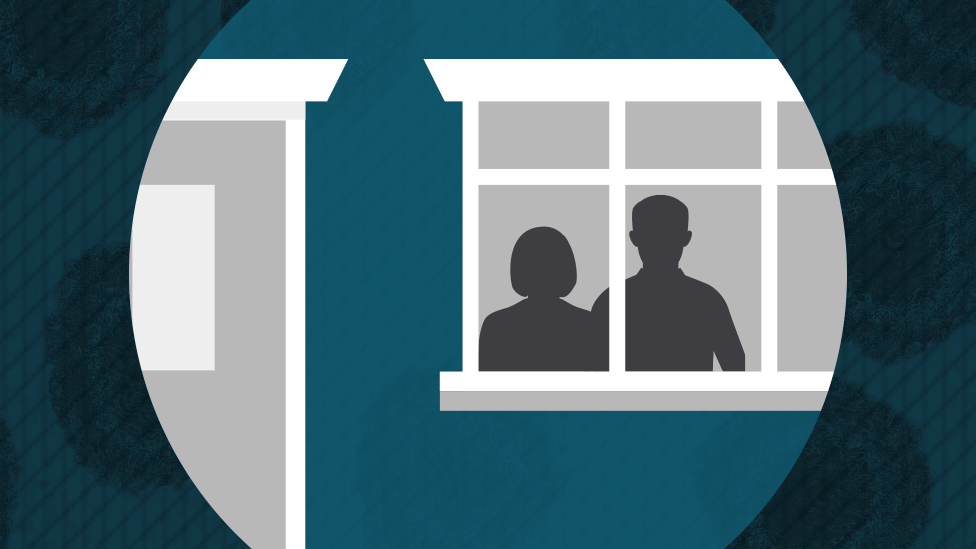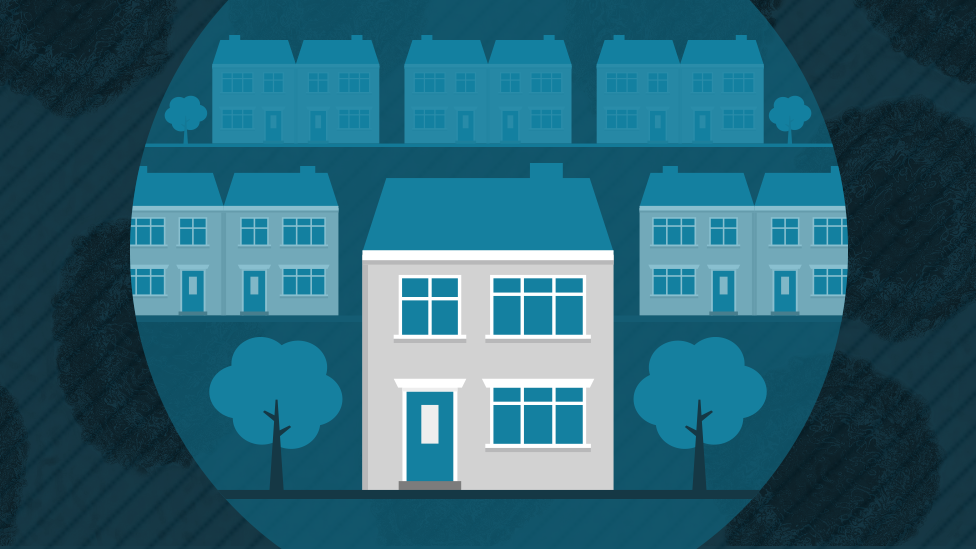Covid: Extra 1.7m vulnerable added to shielding list
- Published
- comments

There is to be a large expansion of the number of people being asked to shield in England.
An extra 1.7 million people are expected to be added to the 2.3 million already on the list.
Half of the group have not yet been vaccinated so will now be prioritised urgently by their local GPs.
It comes after a new model, external was developed that takes into account extra factors rather than just health.
This calculation includes things such as ethnicity, deprivation (by postcode) and weight to work out a person's risk of becoming seriously ill if they were to catch Covid.
It also looks at age, underlying health issues and prescribed medications.
Prof Andrew Hayward, a member of the New and Emerging Respiratory Virus Threats Advisory Group (Nervtag), which has been involved in the modelling, said it considered a "combination of factors" such as age, ethnicity and chronic illness and put them together to reach a score.
He told BBC Radio 4's PM programme that this score could "more or less order people in the population according to their level of risk" and "identify those at the top of that range to say, 'you should be prioritised for vaccine and you have a level of risk that is similar to those on the shielding list'".
Until now, only those with specific conditions or undergoing certain types of treatment have been advised to shield until 31 March.
They include adults with Down's Syndrome, organ donor recipients and people with severe respiratory conditions.
The new model was developed following work by Oxford University which looked at the characteristics of people who died in the first wave to better understand risk.
Medical records have been searched to identify high-risk patients, based on their combined risk factors.
They are now being sent letters by the NHS informing of them of their new status, which means they are entitled to statutory sick pay, prioritisation for online shopping slots and help collecting medicines.
Major task for councils
Some local authorities with areas of high deprivation will now have a major task in contacting people to check what support they need, according to the BBC's health editor Hugh Pym.
Cllr Neil Nerva, public health lead at Brent Council, in north-west London, told BBC News: "We've got 17,000 people who are shielding. The news today means that over the next two weeks we're going to be shielding another 12,000 people who are over 70 and another 12,000 who are under 70."
He added: "That, I think, shows in very graphic terms the health inequalities which exist in a borough like Brent."

Have you been added to the shielding list? You can get in touch with us by emailing haveyoursay@bbc.co.uk, external.
Please include a contact number if you are willing to speak to a BBC journalist. You can also get in touch in the following ways:
WhatsApp: +44 7756 165803
Tweet: @BBC_HaveYourSay, external
Please read our terms & conditions and privacy policy

Bumped up the list
Of the 1.7 million people newly added to the list, around 900,000 have already received an offer of a vaccination because they were over 70.
The remainder are all thought to fall into one of the priority groups for vaccination that are being invited for vaccination next.
They will be bumped up the list first for a jab, the government said.
It means they will receive the offer a few weeks later than if they had been in the shielding group originally.
Shielding was re-introduced in tier four areas from mid-December, before being expanded nationally once the third lockdown was announced in early January.
Unlike in the first lockdown, people who are shielding are being advised they can leave their homes for exercise.

What is shielding?
Government guidelines, external strongly advise clinically extremely vulnerable people to stay at home at all times, apart from going out to exercise or to attend a medical appointment.
They should also try to stay 2m (6ft) away from other people within their household, especially if they display symptoms of the virus or have been advised to self-isolate.
People on the list are still advised to shield even if they have had two doses of the vaccine.
Who is on the shielding list?
High risk categories, external include:
Solid organ transplant recipients
Some people with cancer who are undergoing treatments such as chemotherapy and radiotherapy
People on immunosuppression drugs
Women who are pregnant and have heart disease
People with severe respiratory conditions - cystic fibrosis, severe asthma and COPD
Some people with rare diseases such as severe combined immunodeficiency
Adults with Down's syndrome
Adults on dialysis or with stage 5 chronic kidney disease
The list does not include all elderly people, although they are strongly advised to do social distancing.

England's deputy chief medical officer Dr Jenny Harries said: "All of these people who are identified for the first time, are those who have not had an individual clinical condition that we've previously been able to identify through the clinically extremely vulnerable group, but they are people who have multiple personal risk factors and underlying health conditions which move them into a higher risk group."
She said adding people to the shielding list ensured "those most vulnerable to Covid can benefit from both the protection that vaccines provide and from enhanced advice and support should they choose it".
The approach was "risk averse" to "protect as many people as possible", she added.
Phillip Anderson, of the MS Society, said some people with multiple sclerosis were being added to the shielding list.
He said it would come as a "huge shock" to people who would potentially have to make "drastic changes" to their lives.
The Westminster government said the model had been shared with the other nations of the UK, who would decide individually how to use it.
There are no current plans to formally expand the shielding list in Scotland, Wales or Northern Ireland in the same way as in England.
The Welsh government said the same computer model had already been used to add those with chronic kidney disease and adults with Down's Syndrome to its list of those who are extremely clinically vulnerable.
In Northern Ireland, GPs and hospital doctors can add individual patients to the shielding list if they are assessed as extremely vulnerable based on a range of factors.

LOCKDOWN RULES: What are they and when will they end?
SCHOOLS: When will they reopen?
VACCINE: When will I get the jab?
NEW VARIANTS: How worried should we be?

Related topics
- Published13 July 2021

- Published1 July 2022

- Published26 January 2022
